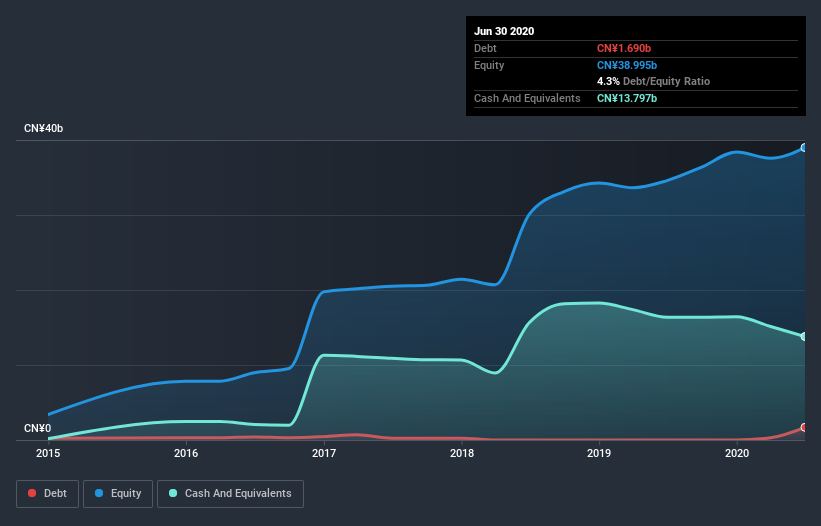ZTO Express (Cayman) (NYSE:ZTO) Seems To Use Debt Quite Sensibly

The external fund manager backed by Berkshire Hathaway's Charlie Munger, Li Lu, makes no bones about it when he says 'The biggest investment risk is not the volatility of prices, but whether you will suffer a permanent loss of capital.' When we think about how risky a company is, we always like to look at its use of debt, since debt overload can lead to ruin. As with many other companies ZTO Express (Cayman) Inc. (NYSE:ZTO) makes use of debt. But is this debt a concern to shareholders?
When Is Debt A Problem?
Debt is a tool to help businesses grow, but if a business is incapable of paying off its lenders, then it exists at their mercy. If things get really bad, the lenders can take control of the business. However, a more common (but still painful) scenario is that it has to raise new equity capital at a low price, thus permanently diluting shareholders. Of course, the upside of debt is that it often represents cheap capital, especially when it replaces dilution in a company with the ability to reinvest at high rates of return. The first thing to do when considering how much debt a business uses is to look at its cash and debt together.
See our latest analysis for ZTO Express (Cayman)
What Is ZTO Express (Cayman)'s Debt?
As you can see below, at the end of June 2020, ZTO Express (Cayman) had CN¥1.69b of debt, up from none a year ago. Click the image for more detail. But on the other hand it also has CN¥13.8b in cash, leading to a CN¥12.1b net cash position.
A Look At ZTO Express (Cayman)'s Liabilities
The latest balance sheet data shows that ZTO Express (Cayman) had liabilities of CN¥8.78b due within a year, and liabilities of CN¥707.3m falling due after that. Offsetting this, it had CN¥13.8b in cash and CN¥1.35b in receivables that were due within 12 months. So it can boast CN¥5.66b more liquid assets than total liabilities.
This surplus suggests that ZTO Express (Cayman) has a conservative balance sheet, and could probably eliminate its debt without much difficulty. Simply put, the fact that ZTO Express (Cayman) has more cash than debt is arguably a good indication that it can manage its debt safely.
Also good is that ZTO Express (Cayman) grew its EBIT at 11% over the last year, further increasing its ability to manage debt. When analysing debt levels, the balance sheet is the obvious place to start. But it is future earnings, more than anything, that will determine ZTO Express (Cayman)'s ability to maintain a healthy balance sheet going forward. So if you're focused on the future you can check out this free report showing analyst profit forecasts.
Finally, a company can only pay off debt with cold hard cash, not accounting profits. While ZTO Express (Cayman) has net cash on its balance sheet, it's still worth taking a look at its ability to convert earnings before interest and tax (EBIT) to free cash flow, to help us understand how quickly it is building (or eroding) that cash balance. Considering the last three years, ZTO Express (Cayman) actually recorded a cash outflow, overall. Debt is usually more expensive, and almost always more risky in the hands of a company with negative free cash flow. Shareholders ought to hope for an improvement.
Summing up
While it is always sensible to investigate a company's debt, in this case ZTO Express (Cayman) has CN¥12.1b in net cash and a decent-looking balance sheet. On top of that, it increased its EBIT by 11% in the last twelve months. So we are not troubled with ZTO Express (Cayman)'s debt use. When analysing debt levels, the balance sheet is the obvious place to start. However, not all investment risk resides within the balance sheet - far from it. Like risks, for instance. Every company has them, and we've spotted 2 warning signs for ZTO Express (Cayman) (of which 1 shouldn't be ignored!) you should know about.
If you're interested in investing in businesses that can grow profits without the burden of debt, then check out this free list of growing businesses that have net cash on the balance sheet.
This article by Simply Wall St is general in nature. It does not constitute a recommendation to buy or sell any stock, and does not take account of your objectives, or your financial situation. We aim to bring you long-term focused analysis driven by fundamental data. Note that our analysis may not factor in the latest price-sensitive company announcements or qualitative material. Simply Wall St has no position in any stocks mentioned.
Have feedback on this article? Concerned about the content? Get in touch with us directly. Alternatively, email editorial-team@simplywallst.com.

